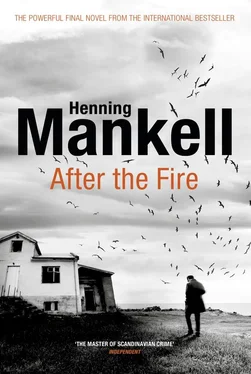I sat in the car for almost four hours before Lisa turned up. I had seen children coming home from school, dropping their bicycles carelessly outside the block. A caretaker had oiled the hinges on the outside door. An elderly man with a wheeled walker, moving incredibly slowly as if he thought he might collapse with every new step, had shuffled inside. He had a bag of shopping looped over the handle of his frame; he seemed like a thousand-year-old man who had passed through the ages and had finally reached this grey concrete box with its unbarred windows and tiny built-in balconies with barely enough room for more than two people.
During all those hours of waiting I avoided thinking about what the anonymous voice on the telephone had said. Nor did I have the strength to examine my reasons for leaving the island and hoping that Lisa Modin would provide me with a place of refuge for a few days. What I wanted more than anything was not a place to sleep, but someone to talk to about everything that had happened. I didn’t really know her and she didn’t know me, but now that Louise had sneaked out the back way, so to speak, I had no one else to turn to.
I wanted both clarity and solace, but of course I didn’t know whether Lisa would be able to give me what I needed. She might not even let me in when I rang the bell and she saw who was standing outside her door.
A woman emerged from the apartment block. She reminded me of Harriet. Harriet as a young woman, when I first met her and we had our brief, chaotic relationship.
That was forty years ago. I had just qualified as a doctor. We met, as people often do, through friends of friends. I knew right from the start that Harriet wasn’t the great love of my life, but I found her attractive. I soon realised that I meant more to her than she did to me, so I pretended that my love also went much deeper than erotic need. I still feel ashamed that I deceived her, made her think that I shared her feelings. Even when she made her way across the ice using her wheeled walker, suffering from terminal cancer, I still couldn’t tell her how I had felt all those years ago. The last thing I robbed her of was the truth.
The woman carried on down the hill. I was on the point of giving up, going back to the island and waiting for the police to come for me. It was pointless, this search for a hiding place that didn’t exist.
I suddenly missed my mother and father, the siblings I had never had, Jansson with his imaginary aches and pains, Harriet, Louise, Oslovski, even Nordin, who had messed up the order for my new wellington boots.
And I wondered if there was anyone who missed me.
Lisa Modin came walking up the hill at ten to six with her rucksack over one shoulder, carrying a bag from the shop where I bought my groceries. She was wearing a red beret, and had a scarf wound around her neck. I slid down as far as possible in my seat. She went inside, and a few minutes later a lamp was switched on in the apartment on the top floor closest to the invisible inlet. I caught a glimpse of her as she opened a window.
I got out of the car and crossed the road. As I reached the door a group of teenage boys came out, talking about a girl called Rosalin; apparently they all wanted to undress her and go to bed with her.
I climbed the stairs slowly in order to avoid getting out of breath. I could hear accordion music coming through one door and a loud telephone conversation through another. The wheeled walker was on the first-floor landing, so I concluded that this must be where the thousand-year-old man lived. Did he only need the walker when he was outdoors? Or did he have another one, specifically for indoor use?
I reached the top floor and paused to catch my breath. Although I had taken my time, my pulse rate had still increased. On Lisa Modin’s door there was a picture of a man with a camera in his hand. When I read the caption at the bottom I learned that he was a photographer called Robert Capa, and that the picture had been taken in France at the end of the Second World War. I had never heard of him, but if Lisa had put his picture on her door, then he must be important to her.
I listened for a moment; I couldn’t hear anything from inside the apartment. I opened the letter box a fraction and listened again. The light was on in the hallway, but I still couldn’t hear a thing.
I hesitated. How would I explain the fact that I had simply turned up without contacting her first? What was I actually expecting?
I made several attempts to ring the doorbell, but kept drawing back my hand at the last second. I realised how pointless the whole thing was, and I had lost my nerve. If I drove back to the harbour now, I would have time to row over to the island before it was completely dark.
I set off down the stairs. After a couple of steps I turned, went back up and immediately rang the bell. I wanted to run away again, but I stayed where I was. Lisa flung the door open, as if she had been disturbed. When she saw me she frowned, but she was smiling at the same time.
‘You,’ she said. ‘The man whose house burned down.’
‘I hope I’m not disturbing you.’
She didn’t reply; she just stepped aside and let me in. A big black cat was sitting on a mirrored shelf, contemplating me with displeasure. When I tried to stroke it, it jumped down and ran off.
Lisa handed me a coat hanger.
‘The cat’s name is Sally,’ she said. ‘Even though he’s a tom. He doesn’t like strangers.’
I hung up my jacket and kicked off my boots.
‘I don’t want to disturb you,’ I said again.
‘You’ve already said that, but I’m curious — why are you here?’
‘I’ve got nowhere else to go.’
She was wearing a green dressing gown. She tightened the belt around her waist, waiting for me to say something else. I didn’t.
She showed me into her living room. On the way we passed the half-open door of her bedroom. The duvet was thrown back; presumably she had been lying down when I rang the bell.
It was indeed possible to see the blue waters of the inlet from the living-room window. Lisa had positioned an armchair and a table with a pile of books on it in the spot which gave her the best view. There wasn’t much furniture, and hardly any pictures. A door led into another bedroom, while the kitchen was an open-plan arrangement.
She gestured towards the red sofa in front of a glass coffee table; its legs suggested that it might be from an Arab country.
‘What can I offer you?’
‘Nothing.’
‘In that case I’m going to make a pot of tea, then you can have a cup if you change your mind.’
She went into the kitchen and I looked around the living room. There was nothing to indicate the presence of a man. I couldn’t be sure, but there was no harm in hoping. When she had poured water into the teapot she disappeared into her bedroom and came back fully dressed.
She served the tea in white cups, and placed a plate of biscuits on the table.
‘So,’ she said. ‘Why have you come here?’
‘I don’t know where to start.’
‘I usually find the beginning is the easiest place.’
I already knew I wasn’t going to tell her the truth, but I also knew that for a lie to work, most of what you say must be true. It is only the conclusions that can contain the lie, twisting the story on its own axis. At the same time I thought the truth was impossible to deliver on this occasion, because I didn’t know what it was.
‘You know the beginning,’ I said. ‘The accusation that I’m an arsonist. I’m not.’
‘So surely it’s important for you to defend yourself? No one is convicted without solid proof of their guilt.’
‘I’ve already been convicted. I had a phone call to say I was going to be arrested. I’ve also received several anonymous letters.’
Читать дальше












